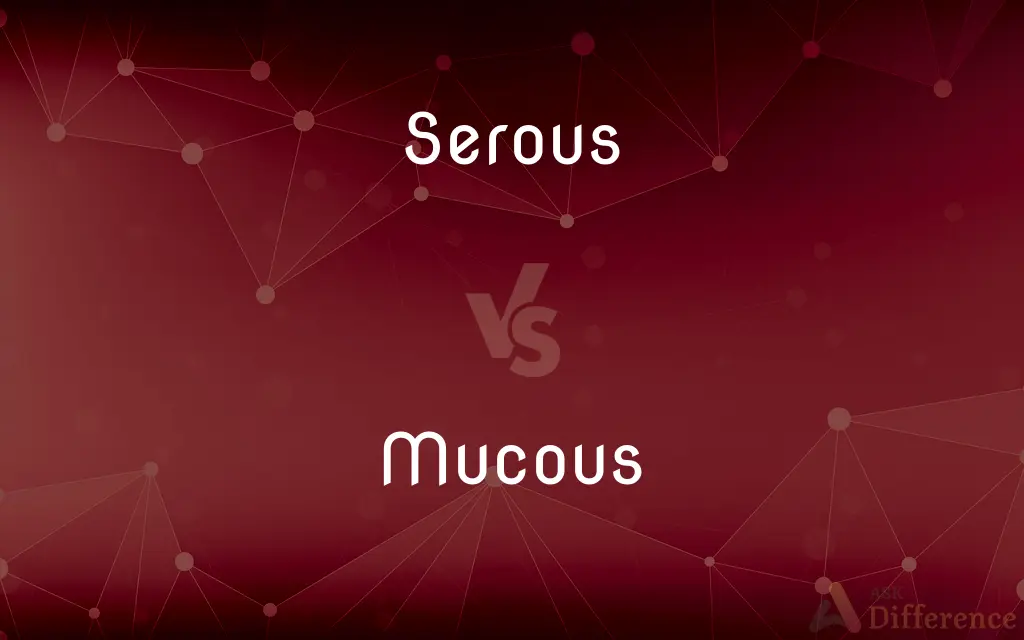Serous vs. Mucous — What's the Difference?
Edited by Tayyaba Rehman — By Fiza Rafique — Updated on September 25, 2023
Serous refers to a clear, watery fluid, often associated with body cavities and serous membranes, while mucous pertains to a viscous, slippery secretion produced by mucous membranes.

Difference Between Serous and Mucous
Table of Contents
ADVERTISEMENT
Key Differences
The human body contains various fluids that serve different functions, with Serous and Mucous being among them. Serous fluid is a clear, watery liquid that is commonly found in body cavities, especially those surrounded by serous membranes. Its primary role is to reduce friction between the membranes of body cavities and the organs they encompass, allowing for smooth movement.
Mucous, on the other hand, is a thicker, often slimy secretion produced by mucous membranes. These membranes line various parts of the body, including the respiratory, digestive, and reproductive tracts. Mucous serves as a protective barrier, trapping foreign particles and pathogens, while also lubricating the surfaces it covers.
While both Serous and Mucous are protective in nature, their consistencies and locations differ markedly. Serous fluid, with its watery consistency, is not sticky and doesn't provide a barrier function. Instead, it offers a lubricative role, especially in cavities like the pericardium around the heart or the pleura around the lungs.
Mucous, due to its viscous consistency, serves a dual purpose. Not only does it offer lubrication for areas such as the digestive tract, but its sticky nature also means it can trap and remove potential threats, like dust in the respiratory system. Both Serous and Mucous are vital for the body's health, playing roles that ensure our organs function optimally and are protected from harm.
Comparison Chart
Consistency
Watery
Viscous, slippery
ADVERTISEMENT
Primary Function
Lubrication
Lubrication and protective barrier
Location
Body cavities (e.g., pericardial, pleural)
Mucous membranes (e.g., respiratory, digestive tracts)
Barrier Function
No
Yes
Appearance
Clear
Slimy, often cloudy
Compare with Definitions
Serous
Pertaining to a thin, clear bodily fluid.
The serous fluid in the pericardial sac allows the heart to beat without friction.
Mucous
Relating to a thick, slimy secretion from mucous membranes.
Mucous in the nose traps dust and pathogens.
Serous
Related to membranes lining certain body cavities.
The pleura is a serous membrane surrounding the lungs.
Mucous
Indicative of a gel-like consistency.
The mucous consistency of the substance made it sticky.
Serous
Indicative of secretions that are non-viscous and watery.
A serous discharge is typically clear and thin.
Mucous
Pertaining to the membranes that produce a viscous fluid.
The mucous membrane of the stomach produces mucus to protect its lining.
Serous
Referring to certain glands producing watery secretions.
The serous glands in the mouth help in producing saliva.
Mucous
Not clear, often cloudy due to its composition.
A mucous discharge can indicate an infection.
Serous
Not associated with pus or mucus.
The wound had a serous exudate, indicating no infection.
Mucous
Serving as a barrier and lubricant in various body tracts.
The mucous in the throat helps food slide down easily.
Serous
Containing, secreting, or resembling serum.
Mucous
Relating to, producing, covered with, or of the nature of mucus.
Serous
(medicine) Containing, secreting, or resembling serum; watery; a fluid or discharge that is pale yellow and transparent, usually representing something of a benign nature. (This contrasts with the term sanguine, which means blood-tinged and usually harmful.)
Mucous
Containing, producing, or secreting mucus
A mucous tissue.
Serous
Thin; watery; like serum; as, the serous fluids.
Mucous
Relating to, consisting of, or resembling mucus
A mucous substance.
Serous
Of or producing or containing serum;
A serous exudate
Mucous
Pertaining to mucus
Mucous
Having the qualities of mucus
Mucous
Of, pertaining to, or resembling, mucus; slimy, ropy, or stringy, and lubricous; as, a mucous substance.
Mucous
Secreting a slimy or mucigenous substance; as, the mucous membrane.
Mucous
Of or secreting or covered with or resembling mucus;
Mucous tissue
Mucous glands of the intestine
Common Curiosities
What does mucous primarily do?
Mucous acts as a protective barrier and lubricant.
What produces mucous in the body?
Mucous membranes produce mucous.
Is serous fluid associated with infections?
Not typically; serous fluid is usually clear and thin.
Which secretion is thicker, serous or mucous?
Mucous is thicker and more viscous than serous.
Where is serous fluid commonly found?
In body cavities like the pericardium or pleura.
Can serous fluid become harmful?
Yes, if there's an overproduction, leading to conditions like pleural effusion.
Is mucus the same as mucous?
"Mucus" is the substance, and "mucous" describes its nature or source.
Are serous membranes present in the respiratory system?
No, serous membranes are in body cavities like pleural and pericardial spaces.
Do all body openings have mucous?
Many, like the nose, mouth, and reproductive tracts, have mucous membranes.
What is the primary function of serous fluid?
Serous fluid primarily serves as a lubricant in body cavities.
Which is more common, serous or mucous secretions?
Both are common but in different parts of the body. Mucous is more widespread in body tracts, while serous is specific to certain cavities.
Why is mucous sticky?
To trap and remove foreign particles and pathogens.
What can a change in mucous color indicate?
It can be a sign of an infection or other medical condition.
How does serous fluid prevent friction?
By being a watery lubricant between organs and membranes.
Do we swallow mucous?
Yes, mucous from the nasal passages can drain into the throat and be swallowed.
Share Your Discovery

Previous Comparison
Hind vs. Deer
Next Comparison
Indeed vs. YesAuthor Spotlight
Written by
Fiza RafiqueFiza Rafique is a skilled content writer at AskDifference.com, where she meticulously refines and enhances written pieces. Drawing from her vast editorial expertise, Fiza ensures clarity, accuracy, and precision in every article. Passionate about language, she continually seeks to elevate the quality of content for readers worldwide.
Edited by
Tayyaba RehmanTayyaba Rehman is a distinguished writer, currently serving as a primary contributor to askdifference.com. As a researcher in semantics and etymology, Tayyaba's passion for the complexity of languages and their distinctions has found a perfect home on the platform. Tayyaba delves into the intricacies of language, distinguishing between commonly confused words and phrases, thereby providing clarity for readers worldwide.














































